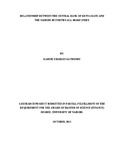| dc.description.abstract | This research study set out to examine whether a relationship between the Central Bank
Rate and the Nairobi All Share Index exists. It used data collected over the period 2008 to
2013 which was collected from the Central Bank of Kenya and the Capital Markets
Authority. The research was based on the simple regression analysis of secondary data
with SPSS version 17 was used to undertake the analysis.
This study is necessitated by the contradictory results from previous studies and the need
to establish a relationship between the CBR and the NASI. Some of the previous studies
done conclude that a positive relationship exists between the stock indices and the
Central Bank Rate, which in some countries is referred to as the Federal Funds Rate,
whereas others indicate that an inverse relationship exists. This research seeks to
establish whether in Kenya a positive or negative (inverse) relationship prevails.
The research reviews various relevant theories which were used to construct the
theoretical foundation for the study. These theories also facilitated the development of an
expected relationship between the Central Bank Rate and the Nairobi Securities
Exchange All Share Index.
The findings of this research establish that an inverse relationship between the Central
Bank Rate and Nairobi Securities Exchange All Share Index exists. This study confirms
the researcher’s priori argument that a negative relationship exists between the two
variables, it however disagrees with a few previous studies and which had established a
positive relationship.
The study has developed various recommendations which may aid in the interactions
between the central bank and the Nairobi Stock exchange. One such recommendation is
that the MPC should avoid frequent adjustments of the CBR as this may result in a highly
volatile market that may impact negatively on investments. Thus the MPC should subtly
adjust the rates slowly over a period of time to allow the market to adjust to it otherwise
sudden large changes in the rate may cause shock waves in the marke | |

